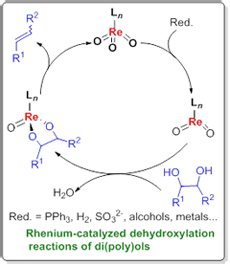| [1] (a) Cao, X. H. Chem. Ind. Eng. Prog. 2007, 26, 905 (in Chinese). (曹湘洪, 化工进展, 2007, 26, 905.)
(b) Min, E. CIESC J. 2006, 57, 1739 (in Chinese). (闵恩泽, 化工学报, 2006, 57, 1739.)
(c) Vennestrom, P. N. R.; Osmundsen, C. M.; Christensen, C. H.; Taarning, E. Angew. Chem., Int. Ed. 2011, 50, 10502.
[2] Ragauskas, A. J.; Williams, C. K.; Davison, B. H.; Britovsek, G.; Cairney, J.; Eckert, C. A.; Frederik, W. J. Jr.; Hallett, J. P.; Leak, D. J.; Liotta, C. L.; Mielenz, J. R.; Murphy, R.; Templer, R.; Tschaplinski, T. Science 2006, 311, 484.
[3] Werpy, T.; Peterson, G. Top Value Added Chemicals from Biomass: Vol. 1, U. S. Department of Energy, Washington D. C., 2004.
[4] Corma, A.; Iborra, S.; Velty, A. Chem. Rev. 2007, 107, 2411.
[5] For our work, see: (a) Xia, D.; Wang, Y.; Du, Z.; Zheng, Q.-Y.; Wang, C. Org. Lett. 2012, 14, 588.
(b) Wang, Y.; Zhang, L.; Yang, Y.; Zhang, P.; Du, Z.; Wang, C. J. Am. Chem. Soc. 2013, 135, 18048.
(c) Tang, Q.; Xia, D.; Jin, X.; Zhang, Q.; Sun, X.-Q.; Wang, C. J. Am. Chem. Soc. 2013, 135, 4628.
(d) Tang, H.; Zhou, B.; Huang, X.-R.; Wang, C.; Yao, J.; Chen, H. ACS Catal. 2014, 4, 649. For selected work from other groups, see:
(e) Kuninobu, Y.; Takai, K. Chem. Rev. 2011, 111, 1938.
(f) Jin, H.; Xie, J.; Pan, C.; Zhu, Z.; Cheng, Y.; Zhu, C. ACS Catal. 2013, 3, 2195.
(g) Fukumoto, Y.; Daijo, M.; Chatani, N. J. Am. Chem. Soc. 2012, 134, 8762.
(h) Hua, R.; Tian, X. J. Org. Chem. 2004, 69, 5782.
(i) Liu, Q.; Li, Y.-N.; Zhang, H.-H.; Chen, B.; Tung, C.-H.; Wu, L.-Z. J. Org. Chem. 2011, 76, 1444.
[6] Zhu, Z.; Espenson, J. H. J. Org. Chem. 1996, 61, 324.
[7] Sherry, B. D.; Radosevich, A. T.; Toste, F. D. J. Am. Chem. Soc. 2003, 125, 6076.
[8] Liu, Y.; Hua, R. M.; Sun, H. B.; Qiu, X. Q. Organometallics 2005, 24, 2819.
[9] Ohri, R. V.; Radosevich, A. T.; Hrovat, K. J.; Musich, C.; Huang, D.; Holman, T. R.; Toste, F. D. Org. Lett. 2005, 7, 2501.
[10] Abdukader, A.; Jin, H.; Cheng, Y.; Zhu, C. Tetrahedron Lett. 2014, 55, 4172.
[11] Xu, Q.; Li, Q. Chin. J. Org. Chem. 2013, 33, 18 (in Chinese). (徐清, 李强, 有机化学, 2013, 33, 18.)
[12] Luzung, M. R.; Toste, F. D. J. Am. Chem. Soc. 2003, 125, 15760.
[13] Kennedy-Smith, J. J.; Young, L. A.; Toste, F. D. Org. Lett. 2004, 6, 1325.
[14] Kuninobu, Y.; Ishii, E.; Takai, K. Angew. Chem., Int. Ed. 2007, 46, 3296.
[15] Nielsen, M. B.; Diederich, F. Synlett 2002, 544.
[16] Kuninobu, Y.; Ueda, H.; Takai, K. Chem. Lett. 2008, 8, 878.
[17] Korstanje, T. J.; Jastrzebski, J. T. B. H.; Klein Gebbink, R. J. M. ChemSusChem 2010, 3, 695.
[18] Korstanje, T. J.; Waard, E. F.; Jastrzeki, J. T. B. H.; Klein Gebbink, R. J. M. ACS Catal. 2012, 2, 2173.
[19] Cook, G. K.; Andrews, M. A. J. Am. Chem. Soc. 1996, 118, 9448.
[20] Raju, S.; Jastrzebski, J. T. B. H.; Robertus, M. L.; Klein Gebbink, R. J. M. ChemSusChem 2013, 6, 1673.
[21] Ziegler, J. E.; Zdilla, M. J.; Evans, A. J.; Abu-Omar, M. M. Inorg. Chem. 2009, 48, 9998.
[22] Denning, A. L.; Dang, H.; Liu, Z. M.; Nicholas, K. M.; Jentoft, F. C. ChemCatChem 2013, 12, 3567.
[23] (a) Holm, R. H.; Donahue, J. P. Polyhedron 1993, 12, 571.
(b) Lee, S. C.; Holm, R. H. Inorg. Chim. Acta 2008, 361, 1166.
[24] Kaksonen, A. H.; Puhakka, J. A. Eng. Life Sci. 2007, 7, 541.
[25] Vkuturi, S.; Chapman, G.; Ahmad, I.; Nicholas, K. M. Inorg. Chem. 2010, 49, 4744.
[26] Ahmad, I.; Chapman, G.; Nicholas, K. M. Organometallics 2011, 30, 2810.
[27] Arceo, E.; Ellman, J. A.; Bergman, R. G. J. Am. Chem. Soc. 2010, 132, 11408.
[28] Yi, J.; Liu, S.; Abu-Omar, M. M. ChemSusChem 2012, 5, 1401.
[29] Shiramizu, M.; Toste, F. D. Angew. Chem., Int. Ed. 2012, 51, 8082.
[30] Shiramizu, M; Toste, F. D. Angew. Chem., Int. Ed. 2013, 52, 12905.
[31] For selected transformations, see: (a) Bellemin-Laponnaz, S. ChemCatChem 2009, 1, 357.
(b) Morrill, C.; Grubbs, R. H. J. Am. Chem. Soc. 2005, 127, 2842.
(c) Morrill, C.; Beutner, G. L.; Grubbs, R. H. J. Org. Chem. 2006, 71, 7813.
(d) Hansen, E. C.; Lee, D. J. Am. Chem. Soc. 2006, 128, 8142.
(e) Herrmann, A. T.; Saito, T.; Stivala, C. E.; Tom, J.; Zakarian, A. J. Am. Chem. Soc. 2010, 132, 5962.
[32] Jacobs, C. B.; Nicholas, K. M. ChemSusChem 2013, 6, 597.
[33] McClain, J. M.; Nicholas, K. M. ACS Catal. 2014, 4, 2109. |
